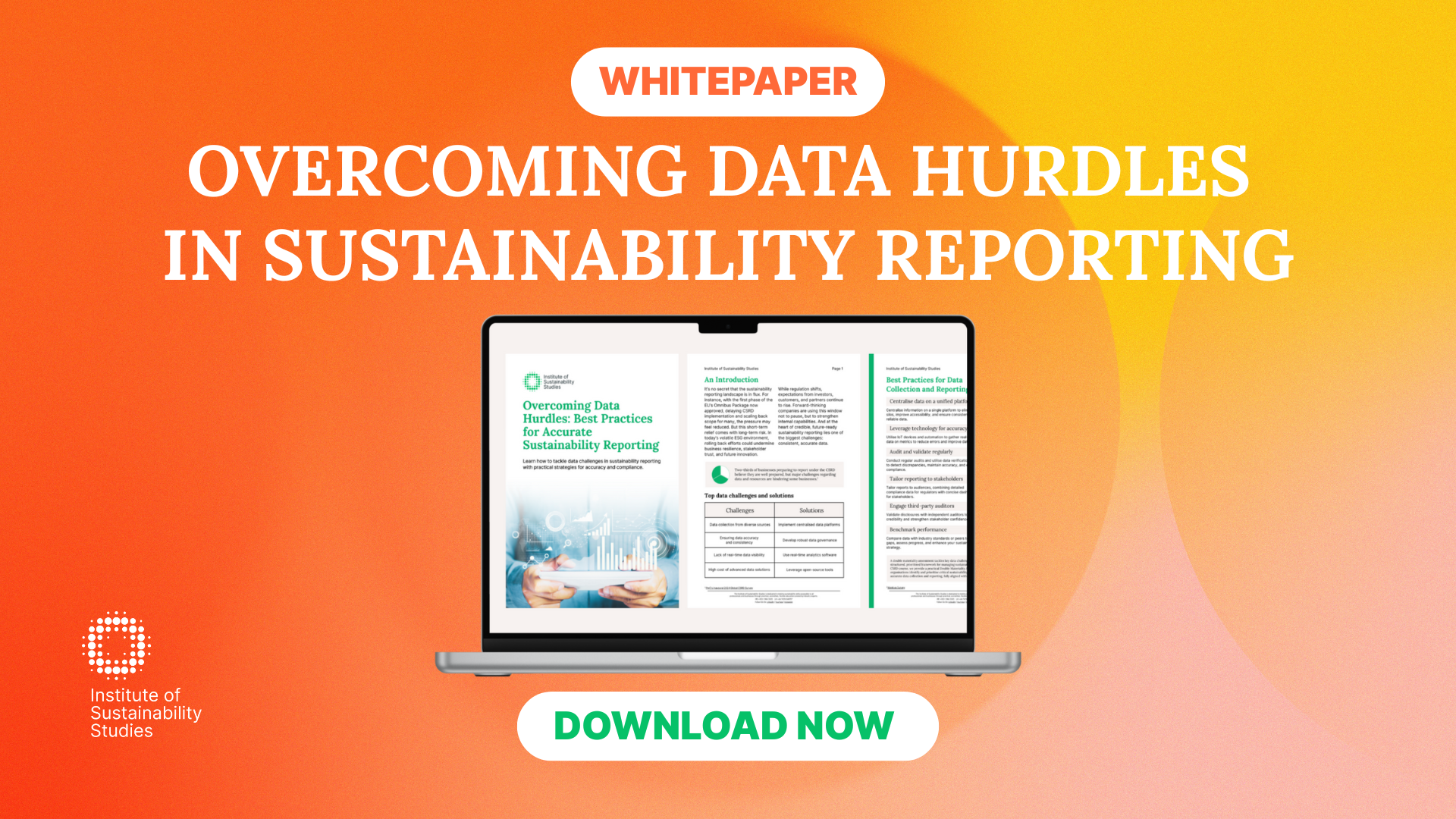McKinsey reports that currently, over 90 percent of S&P companies release ESG reports. ESG scores are becoming a crucial measure of a company’s sustainability strategy, reflecting its commitment to ethical practices, responsible corporate governance, and environmental stewardship.
As investors, consumers, and stakeholders increasingly prioritise businesses that align with strong ESG values, maintaining a good ESG score is essential for long-term success and for fostering trust and resilience. Continue reading as we dive into ESG score meaning and spotlight five companies leading the way with high ESG scores.
ESG score meaning: what is a good ESG score?
A good ESG score signals that a business is effectively managing its environmental impact, social responsibilities, and corporate governance practices. Although the exact scoring scale depends on the rating agency, below is a general guide to ESG score meaning:
- MSCI ESG ratings: Scores range from CCC (poor) to AAA (excellent). A good ESG score for this rating agency would be AA or AAA, indicating leadership in sustainability and governance relative to industry peers.
- Sustainalytics ESG risk ratings: Scores range from 0 (negligible risk) to 40+ (severe risk). A good score typically falls within the negligible (0-10) or low-risk (1020) categories. This means a company has low exposure to unmanaged ESG risks.
- Refinitiv ESG scores: Scores range from 0 to 100. With this in mind, a score above 75 is generally considered to be good as it indicates strong performance across environmental, social, and governance metrics.
How to calculate ESG score
When it comes to calculating ESG scores, businesses typically work with third-party rating agencies or carry out internal assessments based on certain criteria. Moreover, the calculation of the ESG score depends on how important each of the categories is to your business. Here’s how businesses can go about it and comprehend ESG score meaning:
1. Determine the relevant ESG criteria
To begin, you should look at each category – environmental, social, and governance and determine the specific aspects that are most important to you and your business. For example, if that’s environmental, you’ll want to consider your waste generation, energy use, use of natural resources, and transportation choices.
2. Gather the data
After you’ve determined the relevant ESG criteria, you should gather the relevant data to support your judgements. Collect quantitative and qualitative data across the ESG categories. To do this, you can use tools like carbon accounting software or HR systems to ensure the data you collect is accurate. It is also a good idea to engage stakeholders like customers, suppliers, and employees to gain qualitative insights.
3. Leverage ESG reporting frameworks
Businesses should align their data with established ESG reporting frameworks like the Global Reporting Initiative (GRI) and the Sustainability Accounting Standards Board (SASB). These frameworks offer guidelines on what metrics to track and how to report them.
4. Work with an ESG rating agency
After you have completed this foundational work, you can look for a third-party ESG rating agency to partner with to calculate your ESG score. Some popular agencies include MSCI, Sustainalytics, and ISS ESG. These agencies evaluate businesses based on their size, industry, and location, utilising a mixture of publicly available data and company disclosures.
5. Evaluate your performance
Make sure to frequently evaluate your performance for success. Compare your performance against industry benchmarks to see how your company is ranking. Additionally, assess the performance of each ESG pillar separately.
6. Report and strive for improvement
As a final step, make sure to publish annual sustainability reports showcasing your progress and consistently identify areas for improvement.
How to improve ESG score
Improving an ESG score requires efforts across all three pillars. Below are some key steps businesses can take in each section.
Environmental (E) improvements
- Reduce carbon footprint: Implement energy-efficient practices, leverage renewable energy, and set clear carbon reduction targets.
- Sustainable resource management: Minimise waste, water, and energy use by sourcing more eco-friendly materials and operating sustainably.
- Circular economy practices: Improve environmental impact and curb waste by promoting reuse, recycling, and sustainable product design.
Social (S) improvements
- Improve employee well-being: Offer competitive benefits and fair wages and support diversity and inclusion initiatives.
- Community engagement: Support local communities through charitable work, partnerships, and social initiatives.
- Customer and supplier relations: Ensure ethical supply chain practices and provide safe, quality products and services to customers.
Governance (G) improvements
- Transparency and accountability: Ensure robust corporate governance practices with clear policies on ethics, transparency, and accountability.
- Diverse leadership: Promote diversity in boardrooms and executive teams and ensure independent oversight.
- Compliance and risk management: Adhere to industry regulations, adopt ethical business practices, and implement effective risk management systems.
Some additional steps you can take in addition to the above include regularly tracking and publicly reporting on your ESG metrics and performance improvements. Moreover, involving stakeholders in your decision-making processes and allowing for open communication about ESG objectives.
5 companies with high ESG scores
The below five companies are known for having high Environmental, Social, and Governance (ESG) scores due to their commitment to sustainability, social responsibility, and strong governance practices.
Allbirds
Allbirds is a sustainable footwear and apparel company that focuses on using natural and recycled materials, such as merino wool and eucalyptus fibres. The company is committed to transparency, carbon neutrality, and reducing its environmental footprint while also prioritising ethical manufacturing practices.
Eileen Fisher
Eileen Fisher, a sustainable fashion brand, is recognised for its focus on circular economy practices, including recycling and upcycling old clothing. The company uses organic and sustainable fabrics, promotes fair labour conditions, and has a strong commitment to environmental stewardship.
Seventh Generation
Known for its environmentally friendly cleaning and personal care products, Seventh Generation focuses on sustainable sourcing, biodegradable packaging, and reducing waste. The company is also a certified B Corp, ensuring high social and environmental performance.
TOMS
TOMS started with a one-for-one model, donating shoes to those in need for every pair sold. The company has expanded its social impact efforts and now focuses on supporting mental health, access to clean water, and environmental sustainability through its use of sustainable materials.
Blueland
Blueland produces eco-friendly cleaning products with a strong emphasis on reducing plastic waste. Their refillable, reusable packaging system helps cut down on single-use plastic, and the company is committed to transparent business practices and sustainability at every level.
Conclusion
An ESG score is more than just a rating; it’s a valuable tool for tracking performance and driving meaningful climate action. A strong ESG score provides companies with a clear framework to evaluate their environmental, social, and governance efforts, ensuring they stay accountable to both internal and external stakeholders.
It allows businesses to measure progress, identify areas for improvement, and ensure long-term sustainability. By focusing on improving their ESG score, organisations can drive climate action, foster resilience, and stay competitive in an increasingly eco-conscious market. Now is the time for businesses to embrace ESG metrics as a core component of their strategy for positive change.
Dedicated to harnessing the power of storytelling to raise awareness, demystify, and drive behavioural change, Bronagh works as the Communications & Content Manager at the Institute of Sustainability Studies. Alongside her work with ISS, Bronagh contributes articles to several news media publications on sustainability and mental health.
- Bronagh Loughlinhttps://instituteofsustainabilitystudies.com/insights/author/bronagh/
- Bronagh Loughlinhttps://instituteofsustainabilitystudies.com/insights/author/bronagh/
- Bronagh Loughlinhttps://instituteofsustainabilitystudies.com/insights/author/bronagh/
- Bronagh Loughlinhttps://instituteofsustainabilitystudies.com/insights/author/bronagh/









